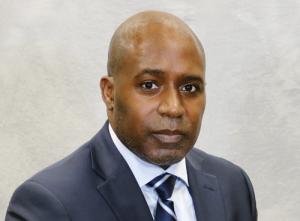State Commissioners
Jehmal Hudson chairs the Virginia State Corporation Commission and NARUC’s Committee on Energy Resources and the Environment. Paul Kjellander is PUF Senior Advisor and former Idaho PUC Chair.
Ten Commissioners discuss their concerns about electric power infrastructure.

PUF's Paul Kjellander: What are the most important needs for electric power infrastructure?
Chair Jehmal Hudson: The power grid has been the most important electric system for well over a hundred years, but that system is getting older every day. With age comes increased safety and reliability risks. Failures in these areas negatively impact both people's everyday lives and the broader economy.
The most important concern for me is how we can address these present risks, as well as tackle the electrification requirements of the future. For example, economic growth, transportation electrification, and the proliferation of AI all will demand more and more from our aging infrastructure.
PUF: Let's talk more about your greatest concerns for that infrastructure.
Chair Jehmal Hudson: Sure. The grid today challenges us in a myriad of ways. There are thousands of miles of physically old poles and conductor that are reaching, or have surpassed, the end of their useful lives.
And instead of in-kind replacement, we must strategically consider how to improve infrastructure. For example, using steel poles instead of wood. Or replacing outdated meters at people's homes with more advanced meters that support options like time-of-use rates.
There is pressure not just to replace parts, but to modernize the grid, and to do so with energy from carbon-neutral resources.
Then of course, there're interconnection queue challenges we're all familiar with. But when we talk about the greatest concern, it's about costs. How can we as a society, and as regulators particularly, support utility plans and projects that accomplish all this, at costs that are just and reasonable for ratepayers to bear?
PUF: As a regulator, how should utility regulation adjust to these needs and concerns, if at all?
Chair Jehmal Hudson: In Virginia, the State Corporation Commission implements the policies of our General Assembly, and we try to do that faithfully.
Where we have discretion, it's important that we try to balance the consumers' and utilities' needs. We look at evidence like whether a cost-benefit analysis supports a utility's request, or whether less expensive options have been considered.
That aspect of utility regulation hasn't changed. What has changed, to some extent, are the types of cases we're seeing. For example, ten years ago, our utilities weren't filing proposals to modernize the distribution grid. Our Commission also has seen an uptick in requests for transmission line builds and rebuilds to support the population and our economy, including data centers.
I don't think our utility regulation process has changed or needs to change. We continue to look at the priorities set by our legislators and consider what's in the public interest. But we are doing that analysis in a broader array of cases.
PUF: How different will electric power infrastructure be in the year 2040?
Chair Jehmal Hudson: I certainly envision an electric grid that supports transportation electrification. To make that a reality, we have to look at charging infrastructure. We also have to consider rate design, such as time-of-use options or other mechanisms.
We have to consider storage. Could renewable energy captured during the day be used to charge vehicles at night? Could fully charged vehicle batteries return energy to the power grid when it's stressed? There's a lot to consider.
Most important, we have to look at consumer adoption and affordability. But I do think electrification of transportation will be a game changer in 2040.
PUF: As you think about infrastructure needs, how does it compete with concerns about affordability?
Chair Jehmal Hudson: I see them both as equally competing interests for state regulators. Our society expects the grid to do more, without interruption, than when the power grid was built out eighty to one hundred years ago.
And without dependable infrastructure, reliability suffers, with cascading effects on people, businesses, and the broader economy. Competing with these expectations and concerns is the reality of what ratepayers can afford.
Ratepayers fall across the financial spectrum, and some people already have to choose between paying their electric bill or buying other necessities like medication. How much of a rate increase should ratepayers be expected to pay, for the benefits they'll receive from enhanced infrastructure? As state regulators, we are always trying to balance those multiple interests.
PUF: Does affordability outweigh the utility's financial requirements?
Chair Jehmal Hudson: In my role, I don't see that one outweighs the other. We Commissioners take each case as it comes and decide issues based on the record before us.
We might, for example, look at whether we can approve part of an infrastructure proposal, instead of a utility's full request, out of concerns for affordability. It's a juggling act to keep the lights on at prices ratepayers can afford. We strive to make choices that strike the right balance for all concerned.
Commission articles at fortnightly.com:


